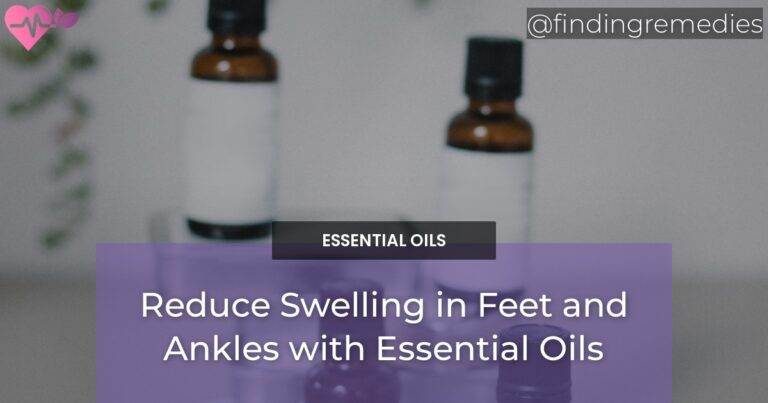Swelling in the feet and ankles, also known as edema, is a common condition that can be caused by various factors. Edema can be uncomfortable and may interfere with daily activities. While there are several treatment options available, using essential oils can be an effective and natural way to reduce swelling and improve circulation. In this article, we will discuss the causes and risk factors for edema, as well as the top essential oils that can help improve circulation. We will also explore recommended massage techniques and when it is necessary to seek medical attention for swelling. By incorporating essential oils and massage techniques into your routine, you can find relief from swelling and promote overall well-being.
Causes and Risk Factors for Edema
Edema Overview
Edema is characterized by the abnormal accumulation of fluid in the body’s tissues, leading to swelling. It commonly occurs in the feet and ankles but can also affect other areas such as the hands, legs, and abdomen. Edema can be a symptom of an underlying medical condition or a result of certain lifestyle factors. Understanding the causes and risk factors associated with edema is essential in determining the appropriate course of treatment.Causes of Edema
There are various causes of edema, including:Heart Conditions
Heart conditions, such as congestive heart failure, can cause fluid retention and lead to edema. When the heart is unable to pump blood effectively, fluid can accumulate in the body’s tissues.Kidney Conditions
Kidney diseases or conditions that impair kidney function can result in fluid retention and edema. The kidneys play a vital role in regulating fluid balance in the body, and any dysfunction can lead to swelling.Liver Conditions
Liver diseases, such as cirrhosis, can cause fluid accumulation in the abdomen and lower extremities. This condition, known as ascites, often leads to significant swelling.Pregnancy
During pregnancy, hormonal changes and increased pressure on veins can contribute to swelling in the feet and ankles. This type of edema is generally temporary and resolves after childbirth.Medications
Certain medications, such as calcium channel blockers, nonsteroidal anti-inflammatory drugs (NSAIDs), and corticosteroids, can cause fluid retention and edema as a side effect.Infections
Infections, particularly those affecting the legs and feet, can lead to inflammation and swelling. Cellulitis, a bacterial skin infection, is a common cause of localized edema.Injuries and Surgery
Injuries, such as sprains or fractures, can result in localized edema as a natural response to tissue damage. Additionally, post-surgical swelling is a common occurrence and usually resolves with time.ALSO READ
Risk Factors for Edema
Several risk factors increase the likelihood of developing edema. These include:Age
As we age, the circulation and efficiency of various bodily systems may decline, increasing the risk of fluid retention and edema.Obesity
Excess weight puts added pressure on the veins and lymphatic system, making it more difficult for fluid to circulate properly and leading to swelling.Sitting or Standing for Prolonged Periods
Remaining in one position for extended periods, such as sitting or standing, can impede blood flow and contribute to fluid accumulation in the lower extremities.Hormonal Changes
Hormonal fluctuations, particularly during menstruation or menopause, can cause fluid retention and edema in some individuals.Climate
Extreme temperatures, especially heat, can cause blood vessels to dilate and increase fluid leakage into the surrounding tissues, resulting in swelling.Can Essential Oils also Help Reduce Swelling in Feet and Ankles?
Yes, essential oils can help relieve swelling in feet and ankles. Certain natural oils, known for their anti-inflammatory properties, can help reduce rheumatism pain and swelling when applied topically. Oils like peppermint, eucalyptus, and lavender are popular choices for reducing swelling and discomfort in the feet and ankles.
Essential Oils to Improve Circulation
Improving circulation is crucial in reducing swelling and promoting overall health. Essential oils have been used for centuries to enhance circulation and provide relief from various conditions. The following essential oils are particularly beneficial for improving circulation and reducing swelling in the feet and ankles:Rosemary Oil
Rosemary oil has stimulating properties that can improve blood flow and reduce swelling. Its anti-inflammatory effects help alleviate discomfort associated with edema.ALSO READ

